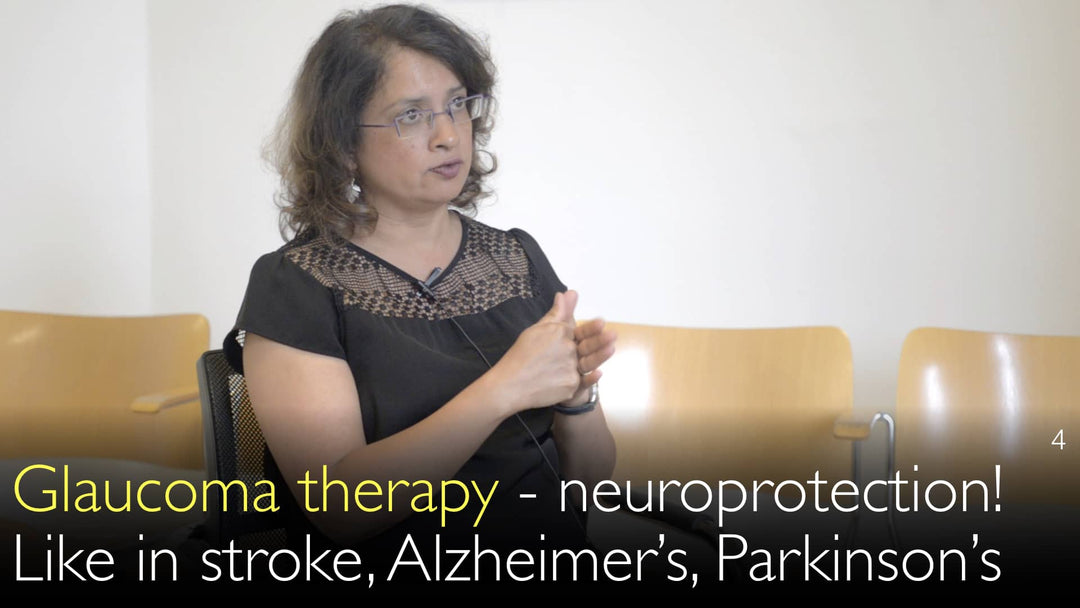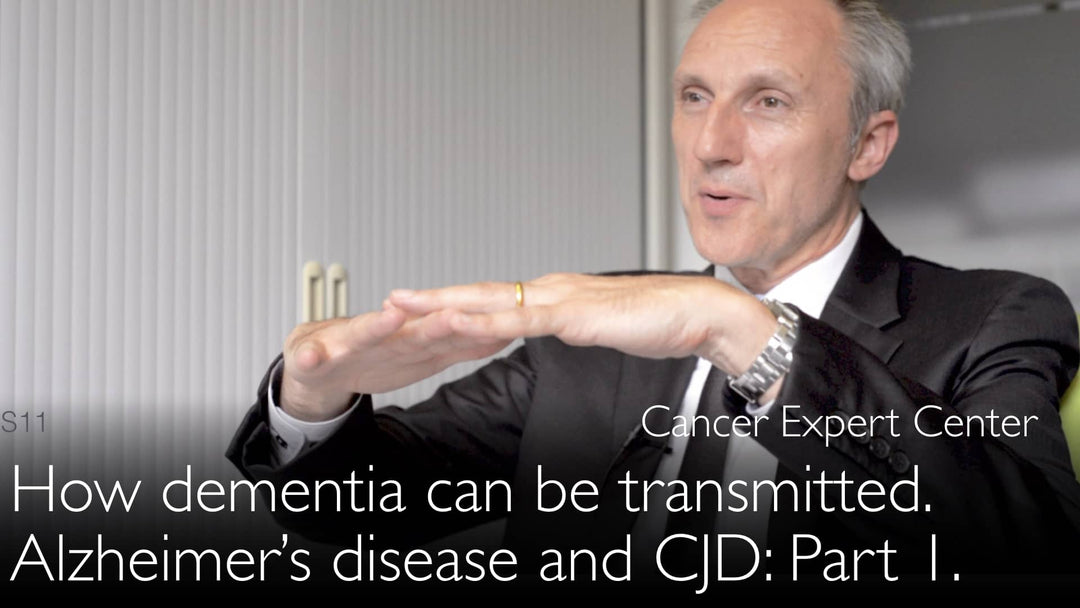Leading expert in glaucoma and neuroprotection, Dr. Francesca Cordeiro, MD, explains how the latest glaucoma treatment strategies are shifting from solely lowering eye pressure to directly protecting retinal nerve cells from degeneration, a therapeutic approach borrowed from Alzheimer's and Parkinson's disease research that is now entering clinical trials for vision preservation.
Neuroprotective Therapies for Glaucoma: New Treatment Directions
Jump To Section
- Neuroprotection as a Glaucoma Treatment Strategy
- Similarities to Alzheimer's and Parkinson's Diseases
- The Role of Eye Pressure in Glaucoma
- Memantine Clinical Trial in Glaucoma
- Challenges in Neuroprotection Clinical Trials
- The Future of Glaucoma Therapies
- The Importance of Accurate Glaucoma Diagnosis
Neuroprotection as a Glaucoma Treatment Strategy
Glaucoma treatment is evolving with a new approach focused on neuroprotection. Dr. Francesca Cordeiro, MD, explains that patients have sought new methods to prevent vision deterioration for the last 15 to 20 years. Neuroprotective agents are treatments designed to prevent nerve cells from dying. In glaucoma, the specific nerve cells targeted for protection are the retinal ganglion cells.
Similarities to Alzheimer's and Parkinson's Diseases
The neuroprotection strategy in glaucoma mirrors approaches used in major brain neurodegenerative diseases. Dr. Francesca Cordeiro, MD, notes that neuroprotection is an accepted treatment principle in Alzheimer's disease, Parkinson's disease, and brain stroke. The same methods applied to brain neurodegeneration can be effectively used in glaucoma. Researchers have borrowed many therapies originally developed for brain diseases and applied them to glaucoma treatment.
The Role of Eye Pressure in Glaucoma
Glaucoma differs from other neurodegenerative conditions because of the significant factor of increased intraocular pressure. Dr. Francesca Cordeiro, MD, clarifies that this pressure element explains why patients often mistakenly believe glaucoma is simply high eye pressure. Traditional glaucoma treatments have focused exclusively on lowering eye pressure, which itself provides a protective effect on nerve cells. This established treatment approach has made developing additional therapies that work through different mechanisms particularly challenging.
Memantine Clinical Trial in Glaucoma
Only two large-scale clinical trials of neuroprotective agents have been conducted for glaucoma. Dr. Francesca Cordeiro, MD, discusses one significant trial involving memantine, a medication borrowed from Alzheimer's disease treatment. Memantine is an NMD A antagonist that prevents cell death by stopping neural hyperexcitation. This oral medication was tested in a very large trial involving approximately 2,000 patients in the 2000s. The pharmaceutical company never published the complete results, issuing only a press release that suggested the trial was not successful in demonstrating memantine's effectiveness for glaucoma prevention.
Challenges in Neuroprotection Clinical Trials
The memantine trial faced significant methodological challenges that likely affected its outcomes. Dr. Francesca Cordeiro, MD, explains that the trial suffered from the same issues that previously plagued Alzheimer's and Parkinson's disease research. The study population wasn't well-defined, including patients at different stages of glaucoma progression. Additionally, investigators were permitted to make subjective decisions about whether patients needed additional therapies during the trial, creating mixed results that were difficult to interpret meaningfully.
The Future of Glaucoma Therapies
Despite past challenges, neuroprotection remains a promising direction for future glaucoma treatment. Dr. Francesca Cordeiro, MD, emphasizes that lessons learned from failed trials have improved clinical trial design for neurodegenerative therapies. The understanding that glaucoma shares mechanisms with other brain diseases continues to drive research into novel neuroprotective approaches. Researchers are developing more targeted therapies that address specific pathways of retinal ganglion cell death in glaucoma.
The Importance of Accurate Glaucoma Diagnosis
Proper glaucoma management begins with accurate diagnosis through comprehensive screening. Dr. Francesca Cordeiro, MD, notes that glaucoma is often a silent eye disease requiring careful evaluation. Correct diagnosis demands interpretation of several specialized eye tests to assess optic nerve health, visual field function, and intraocular pressure. As Dr. Anton Titov, MD, discusses with experts, this diagnostic precision becomes increasingly important as new neuroprotective treatments emerge that may benefit specific patient populations at particular disease stages.
Full Transcript
Glaucoma new treatment approach is based on neuroprotection. It is the same as treatment methods in other brain degenerative diseases, Alzheimer’s disease or Parkinson’s disease.
Glaucoma, a silent eye disease, needs very careful screening. Correct diagnosis requires interpretation of several eye tests.
Dr. Anton Titov, MD: What are the latest trends in glaucoma treatment? Where is the glaucoma treatment field going? What might be available for patients with glaucoma in the near future that might not be available now? Or are some glaucoma treatments at a research stage?
Dr. Francesca Cordeiro, MD: For the last 15 to 20 years, patients have been looking at new methods of preventing deterioration in vision. New diagnostic tests also appeared in neurodegenerative diseases.
We've been very interested in things called neuroprotective agents. Neuroprotection is accepted in diseases such as Alzheimer’s disease, Parkinson's disease, and brain stroke. It means a treatment prevents your nerve cells from dying.
In glaucoma, the nerve cells that you are preventing from dying are the retinal ganglion cells. Interestingly, the same methods that you apply to any neurodegeneration work in glaucoma.
Any lessons from brain disease, such as Alzheimer's disease or Parkinson's disease, can be applied to glaucoma. We have borrowed many therapies for brain neurodegenerative diseases and applied them in glaucoma.
One of the things that is different from glaucoma is that in Alzheimer's disease or Parkinson's disease, it does not exist. But in glaucoma, you have the added factor of increased pressure in the eye.
The reason why patients think that "glaucoma is increased eye pressure" is this. All of our treatments are aimed at lowering the pressure in the eye. That is how we treated glaucoma.
That in itself is probably more of a protective therapy, but we don't call it protection. We call it "treatments to lower the pressure in the eye".
Now, one thing that has been a problem is this. Because we have this very good treatment, establishing other treatments that don't work by decreasing eye pressure is difficult.
We've only had two large-scale clinical trials of neuroprotective agents in glaucoma. One of them came from the world of Alzheimer's disease: this is memantine.
Memantine is an NMD A antagonist. It stops the cell from dying by preventing it from getting excited. Memantine stops cells from being hyperexcited.
This medication is a tablet. It was tried in a very large-scale trial with about 2,000 patients back in the 2000s.
One of the problems with that particular trial is that the pharmaceutical company that did the clinical trial never published the results. All that exists is a press release.
It suggests that the trial was not successful. In other words, memantine wasn't shown to prevent glaucoma. There was a lot of controversy about the test results.
Dr. Anton Titov, MD: Why did memantine not work in glaucoma? But we've learned a lot about the glaucoma clinical trial results, even without results being published.
We have to rely on patients who took part in the clinical trial, usually patients who are investigators in the trial. It was probably the same issues that Alzheimer's disease and Parkinson's disease clinical trials used to have.
They didn't really have a defined population of patients. Patients were at different stages of the eye disease. The investigators were allowed to make up their minds as to whether patients needed further therapy treatments.
Dr. Francesca Cordeiro, MD: So it was all a mixed result. We could probably explain that.
Dr. Anton Titov, MD: Perhaps the glaucoma neurodegeneration therapy results weren't clear because there was a mixture of different degrees of glaucoma eye disease.







